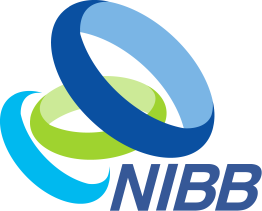
基礎生物学研究所

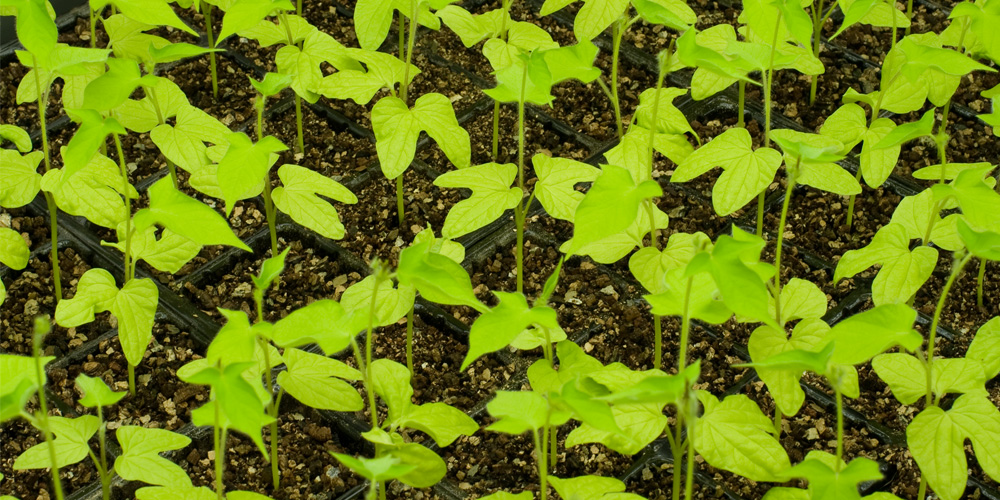
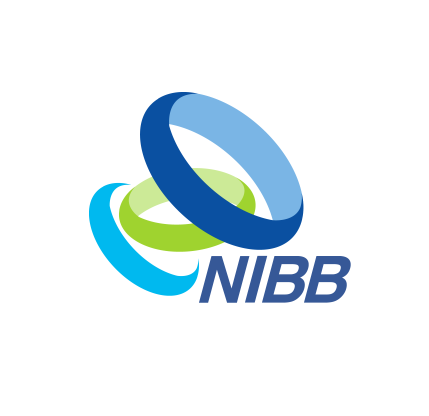

| Organizers | Masayuki. Ohmori (Saitama Univ., Japan) James.M. Tiedje (Michigan State Univ., USA) |
|---|---|
| Venue | Mielpearl Ise-Shima (Shima, Mie) |
| Date | Sep. 26- 30, 2004 |
| Poster |
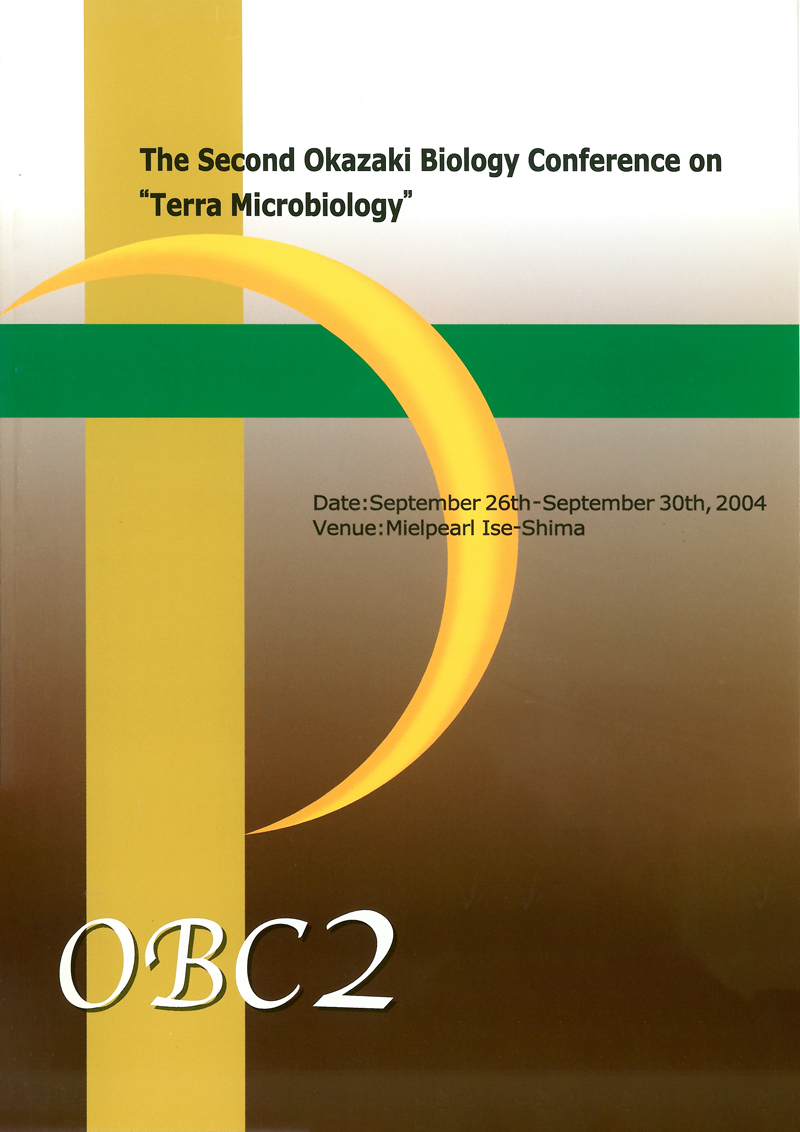
|
会議は4つのセッション((1) 環境による制限と進化の多様性、(2) 生物地球化学的循環と土壌形成、(3) 共生と相互作用、(4) 微生物系への新しいアプローチ) からなり、それぞれを通じて、噴火直後の火山周辺や洞窟、岩石表面などの極端な環境を含む地球上の多様な環境に生育するバクテリアの集団や、バクテリアと植物、バクテリアと昆虫などの共生体について幅広い研究が紹介された。さらに、分子生物学技術とコンピュータを駆使して、遺伝子の側面から複雑な微生物集団を解析する研究の急速な発展が報告された。現代生物学の基礎を築くための重要な貢献をしてきた微生物学が、生物学の新たな発展の最前線を形成しつつあることが示された会議だった。研究の最前線に携わっている若手研究者も多数参加し、5日間隔離された環境の中で集中した雰囲気を持続することにより、今後の研究の核となるコミュニティー形成に資するところが大きかった。
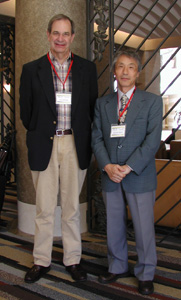
The organizers of the conference: Prof. J.M.Tiedje (Left) and Prof. M.Ohmori (Right)
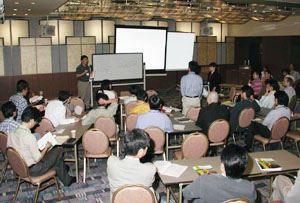
The conference room (Logistics explanation by the secretary Dr. Y. Suwa)
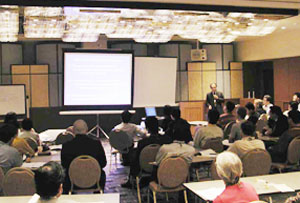
Opening speech by Prof. Y.Nagahama, the chair of OBC committee.
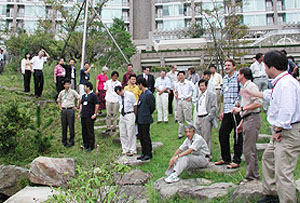
Going out to the garden of the hotel for the group photo.
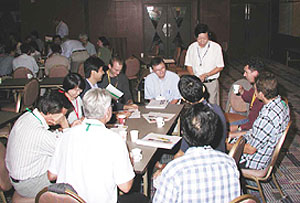
Meetings of the speakers of each session
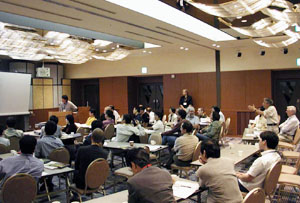
Discussion
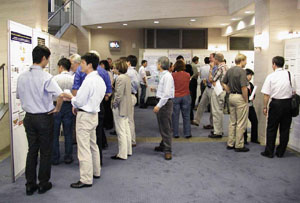
Mixer on the evening of 26th
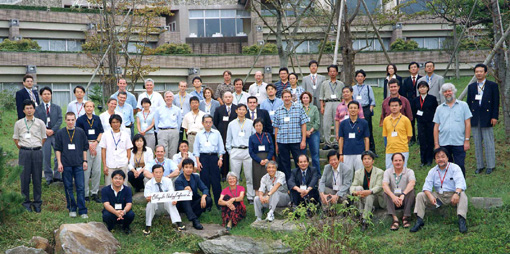
Participants of the conference.
September 26 (Sunday)
07:00-09:00
Breakfast
09:00-11:40
Registration / Chair Meeting
11:40-12:40
Lunch
12:45-13:00
Meeting logistics, Dr. Yuichi Suwa (OBC Secretary, AIST, Tsukuba)
13:00-13:20
Opening Speech, Dr. Yoshitaka Nagahama (National Institute for Basic Biology)
13:20-14:00
Key Note Lecture by Dr. Jim Tiedje (Center for Microb. Ecol., Michigan State Univ., USA)
14:00-14:20
Coffee Break
14:20-14:50
Group Meering by each session
Remarks of Session 4, Dr.Kiwamu Minamisawa (Tohoku Univ.)
15:00-15:40
“Using field-based DNA stable isotope probing(SIP)to explore the identity and activity of biodegrading microbial populations in soil and sediment”
Dr. Eugene L. Madsen (Cornell Univ. USA)
15:40-16:20
“RNA Stable Isotope Probing”
Dr. Andrew S. Whiteley (CEH Oxford, UK)
16:20-16:40
Coffee Break
16:40-17:20
“Theory and application of DNA microchip in microbial community analysis analysis”
Dr. Wen-Tso Liu (National Univ. of Singapore, Singapore)
17:20-18:00
“Dynamics of rhizobial expression and microevolution: what can we know by array analysis?”
Dr. Kiwamu Minamisawa (Tohoku Univ., Japan)
18:00-18:40
“Microbial genome evolution-comparative genome analysis of pathogenic and non-pathogenic bacteria-“
Dr. Ken Kurokawa (Nara Inst. Sci. Technol., Japan)
18:40-21:00
Introduce with each other/ Mixer
September 27 (Monday)
07:00-08:40
Breakfast
08:40-09:20
“Community structure and evolution in an acid mine drainage ecosystem”
Dr. Eric E. Allen (Univ. of California, Berkeley, USA)
09:20-10:00
“Eco-genomis explorations into antarctic bacterioplankton communities”
Dr. Alison Murray (Desert Res. Inst., Usa)
10:00-10:40
“The uncultivated Crenarchaeota from soil:what do we learn from metagenomics?”
Dr. Alexander H. Treusch (Darmstadt Univ. of Technol., Germany)
10:40-11:10
Coffee Break
Remarks of Session 3, Dr.Masanori Saito (Natl. Inst. Agr-Env. Sci. )
11:20-12:00
“Evolution of cooperation and conflict”
Dr. Paul Rainey (The Univ. of Auckland, New Zealand)
12:00-13-30
Lunch/Group photo
13:30-14:10
“Biofilm systems-microbes, polymers and microhabitats-“
Dr. Thomas R. Neu (UFZ Center for Env. Res., Germany)
14:10-14:50
“Endosymbiotic bacteria of insects: biological significance of hidden players”
Dr. Takema Fukatsu (AIST, Tsukuba, Japan)
14:50-15:10
Coffee Break
15:10-15:50
“Cellular symbioses within the symbiotic microbial community in the gut of termites”
Dr. Moriya Ohkuma (RIKEN, Wako, Japan)
15:50-16:30
“The ectomycorrhizal interaction studied by global expression analyses”
Dr. Bengt Söderström (Lund Univ., Sweden)
16:30-16:50
Coffee Break
16:50-17:30
“Creation, organization and maintenance of genetic variability in arbuscular mycorrhizal fungi”
Dr. Alexander M. Koch (Univ. of Lausanne, Switzerland)
17:30-18:40
Short talks
18:40-20:00
Dinner
20:00-21:00
Poster/Video Presentations
PosterList.pdf
September 28 (Tuesday)
07:00-08:20
Breakfast
08:20-09:00
“Fine tuning of nodulation by complementary rhizobial signals”
Dr. William Broughton (Univ. of Geneve, Switzerland)
09:00-09:40
“Challenged by misro-oxia:How rhizobia adapt to the symbiotic life style”
Dr. Hauke Hennecke (Inst. Microbiol., ETH, Switzerland)
09:40-10:00
Coffee Break
Remarks of Session2, Dr.Hiroyuki Ohta(Ibaraki Univ.)
10:10-10:40
“Development of bacterial community on fresh volcanic deposits”
Dr. Hiroyuki Ohta (Ibaraki Univ., Japan)
10:40-11:20
“Microbial colonization of and succession on resent volcanic deposits"
Dr. Gary M. king(Univ. of Maine, USA)
11:20-12:00
“Microbial diversity and community structure in pristine and disturbed soils at different climatic zones”
Dr. Vigdis Torsvik (Univ. of Bergen, Norway)
12:00-18:20
Lunch/then free
18:20-19:20
Dinner
Remarks of Session1, Dr.Kenji Kato(Shizuoka Univ.)
19:40-20:20
“A paleoproterozotic planetary suicide attempt:did the evolution of oxygenic photosynthesis trigger the first snowball earth?”
Dr. Joseph L. Kirschvink (California. Inst. Technol., USA)
20:20-21:00
“Horizontal gene transfer accelerates genome innovation and evolution”
Dr. James A. Lake (UCLA, Los Angeles, USA)
September 29 (Wednesday)
07:00-08:20
Breakfast
08:20-09:00
“Sharing genes and sharing environments:two versions of cooperation”
Dr. Gary J. Olsen (Univ. of Illinois, USA)
09:00-09:40
“Water activity as a factor affecting the development of microbial communities in solid-phase environments”
Dr. Akira Hiraishi (Toyohashi Univ. of Technol., Japan)
09:40-10:00
Coffee Break
10:00-10:40
“Analysis of structure, function, and eco-physiological interactions among community menbers in complex multispecies biofilms”
Dr. Satoshi Okabe (Hokkaido Univ., Japan)
10:40-11:20
“Microbial alteration of geochemistry beneath the soil”
Dr. Kenji Nanba (Univ. of Tokyo, Japan)
11:20-12:00
“Distribution of novel ”Epsilonproteobacteria”in microbial mats from terrestrial caves and springs with sulfidic water”
Dr. Annette Summers Engel (Louisiana State Univ., USA)
12:00-13:30
Lunch
13:30-14:10
“Unseen prokaryotic communities in the earth's interior”
Dr. Fumio Inagaki (JAMSTEC, Japan)
14:10-14:30
Coffee Break
14:30-15:10
“Fungal component in sub-aerial rock-inhabiting communities: role in land colonization and contribution to biogeochemistry of rock surfaces”
Dr. Anna A Gorbushina (Carl v. Ossietzky Univ., Germany)
15:10-15:50
“Emission and consumption of carbonyl sulfide by a chemolitho-autotroph Thiobacillus thioparus THI115 and distribution of micro-organisms carrying the relevant activities in natural environments”
Dr. Yoko Katayama (Tokyo Univ. of Agr. Technol., Japan)
15:50-16:10
Coffee Break
16:10-16:50
“Chemoautotrophic bacteria in biogeochemical cycling”
Dr. Daniel J. Arp (Oregon State Univ., USA)
16:50-17:30
“Autotrophic nitrification in acidic tea field soil”
Dr. Masahito Hayatsu (Shizuoka Univ., Japan)
17:30-18:10
“Mobile xenobiotic-degrading genes and their mobility in soil bacteria”
Dr. Masataka Tsuda (Tohoku Univ., Japan)
18:10-21:00
Farewell Mixer
September 30 (Thursday)
07:00-09:40
Breakfast/Check out
09:40-10:20
Talk, Prof. Masayuki Ohmori (Saitama Univ., Tokyo)
10:20-10:40
Coffee Break
10:40-11:20
Comprehensive and Concluding Discussions, MO, JMT and NIBB
11:20-12:00
Free talk for Future